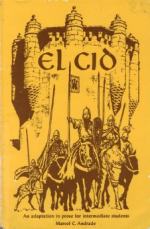|
This section contains 3,179 words (approx. 11 pages at 300 words per page) |

|
SOURCE: Duggan, Joseph J. “Conclusion.” In The Cantar de mio Cid: Poetic Creation in Its Economic and Social Contexts, pp. 143-48. New York, N.Y.: Cambridge University Press, 1989.
In the following excerpt, Duggan asserts that the Cantar de mio Cid was orally composed by a juglar of little formal education, pointing to the poem's emphasis on economic exchange and focus on the marriages of the hero's daughters as indications that the scribe adapted his work to the social interests of his audience.
The “best hypothesis” to which this analysis of the Cantar de mio Cid leads is as follows. In the year 1199 or, more likely, 1200, a juglar of the Transierra, active in the valley of the Jalón, familiar with the area circumscribed by San Esteban, Calatayud, Guadalajara, and Medinaceli, and intent on pleasing Alfonso VIII of Castile and his partisans, performed the poem at Ariza or Huerta...
|
This section contains 3,179 words (approx. 11 pages at 300 words per page) |

|


